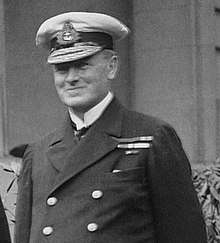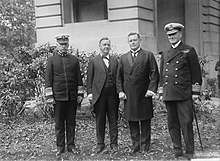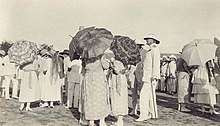Alexander Duff (Royal Navy officer)
Admiral Sir Alexander Ludovic Duff GCB GBE KCVO (20 February 1862 – 22 November 1933) was a Royal Navy officer who served as Commander-in-Chief, China Station.
Sir Alexander Duff | |
|---|---|
 | |
| Born | 20 February 1862 Knockleith, Aberdeenshire |
| Died | 22 November 1933 (aged 71) London, United Kingdom |
| Allegiance | |
| Service/ | |
| Years of service | 1875–1925 |
| Rank | Admiral |
| Commands held | China Station |
| Battles/wars | World War I |
| Awards | Knight Grand Cross of the Order of the Bath Knight Grand Cross of the Order of the British EmpireKnight Commander of the Royal Victorian Order Legion of Honour, Commander Distinguished Service Medal (United States) |
Naval career


Duff joined the Royal Navy as a Midshipman in 1875.[1] He was promoted Commander in 1897, Captain in 1902, and Rear-admiral in 1913. In 1906 he was appointed Deputy-Controller of the Royal Navy. In 1909, he was put in command of HMS Temeraire. He was Director of the Mobilisation Division at the Admiralty from 1912 through the start of the war.[2] He served in World War I as Rear-Admiral (Second-in-Command) of the 4th Battle Squadron, taking part in the Battle of Jutland in 1916, where he was in command of HMS Superb.[2]
He then became Director of the Anti-Submarine Division in 1917.[2] Like the First Sea Lord, Admiral Jellicoe, Duff initially opposed the use of convoys.[3] However, his efforts greatly reduced the destruction caused by the "underwater menace".[4]
After the War he became Assistant Chief of the Naval Staff and then, from 1919, Commander-in-Chief, China Station.[2] He retired in 1925.[2]
Family
In 1886, he married his first cousin Janet Douglas Duff; they had two daughters.[1] In 1924 he married Alice Marjorie Hill-Whitson; they had no children.[1]
References
- Alexander Duff at Oxford Dictionary of National Biography
- Liddell Hart Centre for Military Archives
- Grigg 2002, p50
- Obituary: Admiral Sir Alexander Duff The Sydney Morning Herald, 24 November 1933
External links
- The Dreadnought Project: Alexander Duff
Books
- Grigg, John. Lloyd George: War Leader, 1916–1918 Allen Lane, London 2002 ISBN 0-713-99343-X
| Military offices | ||
|---|---|---|
| Preceded by Sir Frederick Tudor |
Commander-in-Chief, China Station 1919–1922 |
Succeeded by Sir Arthur Leveson |